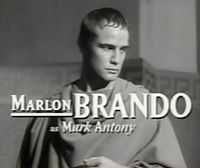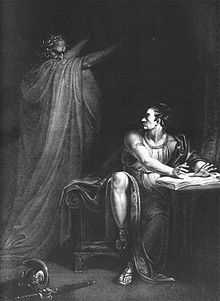Julius Caesar (1953 film)
| Julius Caesar | |
|---|---|
 Theatrical release poster | |
| Directed by | Joseph L. Mankiewicz |
| Produced by | John Houseman |
| Written by |
Joseph L. Mankiewicz William Shakespeare (Play) |
| Starring |
Marlon Brando James Mason John Gielgud Louis Calhern Edmond O'Brien Greer Garson Deborah Kerr |
| Music by | Miklós Rózsa |
| Cinematography | Joseph Ruttenberg |
| Edited by | John Dunning |
| Distributed by | Metro-Goldwyn-Mayer |
Release dates |
|
Running time | 121 minutes |
| Country | United States |
| Language | English |
| Budget | $2,070,000[1] |
| Box office | $3,920,000[1] |
Julius Caesar is a 1953 Metro-Goldwyn-Mayer film adaptation of the play by Shakespeare, directed by Joseph L. Mankiewicz, who also wrote the uncredited screenplay, and produced by John Houseman. The original music score is by Miklós Rózsa. The film stars Marlon Brando as Mark Antony, James Mason as Brutus, John Gielgud as Cassius, Louis Calhern as Julius Caesar, Edmond O'Brien as Casca, Greer Garson as Calpurnia, and Deborah Kerr as Portia.
Casting
Many of the actors connected with this film had previous experience with the play. John Gielgud had played Mark Antony at the Old Vic Theatre in 1930 and Cassius at the Shakespeare Memorial Theatre in Stratford-upon-Avon in 1950, James Mason had played Brutus at the Abbey Theatre in Dublin in the 1940s, and John Hoyt, who plays Decius Brutus, also played him in the 1937 stage version. Gielgud later played the title role in the 1970 film with Charlton Heston, Jason Robards and Richard Johnson (as Cassius) and in a stage production directed by John Schlesinger at the Royal National Theatre. John Houseman, who had produced the famous 1937 Broadway version of the play starring Orson Welles and the Mercury Theatre, also produced the MGM film. By this time, however, Welles and Houseman had had a falling out, and Welles had nothing to do with the 1953 film. P. M. Pasinetti, Italian-American writer, scholar, and teacher at UCLA served as a technical advisor.
Brando's casting was met with some skepticism when it was announced, as he had acquired the nickname of "The Mumbler" following his performance in A Streetcar Named Desire (1951).[2] Director Joseph L. Mankiewicz even considered Paul Scofield for the role of Mark Antony if Brando's screen test was unsuccessful.[3] Brando asked John Gielgud for advice in declaiming Shakespeare, and adopted all of Gielgud's recommendations.[4] Brando performance turned out so well that the New York Times stated in its review of the film: “Happily, Mr. Brando's diction, which has been guttural and slurred in previous films, is clear and precise in this instance. In him a major talent has emerged.”[5] Brando was so dedicated in his performance during shooting that Gielgud offered to direct him in a stage production of Hamlet, a proposition that Brando turned down.[6] During filming, James Mason became concerned that Brando was stealing the audience's sympathy away from him and his character, Brutus, so Mason appealed to Mankiewicz, with whom he had bonded earlier while making the film 5 Fingers, requesting that the director stop Brando from dominating the film and "put the focus back where it belongs. Namely on me!"[7] The subsequent shift in directorial attention didn't escape Brando, who threatened to walk off the film if Mankiewicz "threw one more scene to Mason", alleging a ménage à trois between Mankiewicz, Mason and Mason's wife Pamela.[7] Despite the feuding, production continued with only minimal disruption, thanks to what Gielgud called, "Mankiewicz's consummate tact that kept us together as a working unit."[8]
O.Z. Whitehead is listed on the Internet Movie Database as having played Cinna the Poet in the film and not receiving screen credit, but his one scene was deleted before release, and it is not included in any DVD or video releases of the film. (However, Cinna the Conspirator does appear; he is played by actor William Cottrell.)
Cast
- [Note: The names in brackets are the full Roman names of the historical individuals portrayed in the film.]
- Marlon Brando as Mark Antony [Marcus Antonius]
- James Mason as Brutus [Marcus Junius Brutus (the Younger)]
- John Gielgud as Cassius [Gaius Cassius Longinus]
- Louis Calhern as Julius Caesar [Gaius Julius Caesar]
- Edmond O'Brien as Casca [Servilius Casca]
- Greer Garson as Calpurnia [Calpurnia Pisonis]
- Deborah Kerr as Portia [Porcia Catonis]
- George Macready as Marullus [Gaius Epidius Marullus]
- Michael Pate as Flavius [Lucius Caesetius Flavus]
- Richard Hale as a Soothsayer
- Alan Napier as Cicero [Marcus Tullius Cicero]
- John Hoyt as Decius Brutus [Decimus Junius Brutus Albinus]
- Tom Powers as Metellus Cimber [Tillius Cimber]
- William Cottrell as Cinna [Lucius Cornelius Cinna]
- Jack Raine as Trebonius [Gaius Trebonius]
- Ian Wolfe as Ligarius [Quintus Ligarius]
- Morgan Farley as Artemidorus
- William Phipps as Servant to Antony (as Bill Phipps)
- Douglass Watson as Octavius Caesar [Octavius Caesar / Imperator Caesar Divi Filius Augustus] (as Douglas Watson)
- Douglass Dumbrille as Lepidus [Marcus Aemilius Lepidus]
- Rhys Williams as Lucilius
- Michael Ansara as Pindarus
- Dayton Lummis as Messala [Marcus Valerius Messalla Corvinus]
- Edmund Purdom as Strato
- John Doucette as a Carpenter
- John Hardy as Lucius
- Chet Stratton as Servant to Caesar (as Chester Stratton)
- Lumsden Hare as Publius
- Preston Hanson as Claudius
- Victor Perry as Popilius Lena
- Michael Tolan as Officer to Octavius
- John Lupton as Varro
- Joseph Waring as Clitus (as Joe Waring)
- John Parrish as Titinius
- Stephen Roberts as Dardanius
- Paul Guilfoyle as a Citizen of Rome
- Lawrence Dobkin as a Citizen of Rome
- Jo Gilbert as a Citizen of Rome
- David Bond as a Citizen of Rome
- Ann Tyrrell as a Citizen of Rome
- John O'Malley as a Citizen of Rome
- Oliver Blake as a Citizen of Rome
- Alvin Hurwitz as a Citizen of Rome
- Donald Elson as a Citizen of Rome
Reception
The film received highly favorable reviews.[9] In the second volume of his book The Story of Cinema, author David Shipman pointed to Gielgud "negotiating the verse as in no other Shakespeare film to date except Olivier's".[10] The film currently has a 100% approval rating on Rotten Tomatoes[11] indicating universal acclaim.
Box office
According to MGM records the film earned $2,021,000 in the US and Canada and $1,899,000 elsewhere, resulting in a profit of $116,000.[1]
Music
Intrada Records released an album featuring a 1995 re-recording of the film's score. The re-recording was performed by the Sinfonia of London and conducted by Bruce Broughton.[12]
| Intrada Album | ||||||||||
|---|---|---|---|---|---|---|---|---|---|---|
| No. | Title | Length | ||||||||
| 1. | "Julius Caesar Overture" | 3:15 | ||||||||
| 2. | "Praeludium" | 3:38 | ||||||||
| 3. | "Caesar's Procession" | 2:45 | ||||||||
| 4. | "Flavius Arrested" | 0:18 | ||||||||
| 5. | "Feast Of Lupercal" | 0:44 | ||||||||
| 6. | "Caesar And His Train" | 0:51 | ||||||||
| 7. | "The Scolding Winds" | 2:42 | ||||||||
| 8. | "Brutus' Soliloquy" | 6:34 | ||||||||
| 9. | "Brutus' Secret" | 2:11 | ||||||||
| 10. | "They Murder Caesar" | 1:08 | ||||||||
| 11. | "The Ides Of March" | 4:36 | ||||||||
| 12. | "Black Sentence" | 3:55 | ||||||||
| 13. | "Brutus' Camp" | 1:31 | ||||||||
| 14. | "Heavy Eyes" | 1:47 | ||||||||
| 15. | "Gentle Knave" | 2:07 | ||||||||
| 16. | "Ghost Of Caesar" | 1:42 | ||||||||
| 17. | "Most Noble Brutus" | 1:10 | ||||||||
| 18. | "Battle At Philippi" | 1:28 | ||||||||
| 19. | "Titinius Enclosed" | 0:40 | ||||||||
| 20. | "Caesar Now Be Still!" | 8:54 | ||||||||
| 21. | "Finale" | 1:10 | ||||||||
Awards and nominations


The film won the Academy Award for Best Art Direction (Cedric Gibbons, Edward Carfagno, Edwin B. Willis, Hugh Hunt), and was nominated for the Best Actor in a Leading Role (Marlon Brando), Best Cinematography, Black-and-White, Best Music, Scoring of a Dramatic or Comedy Picture and Best Picture.[13] Brando's nomination was the third time in three consecutive years that he was nominated for the Best Actor Academy Award. He was nominated in 1951 for A Streetcar Named Desire and in 1952 for Viva Zapata!. He would win the following year for On the Waterfront.
It also won two BAFTA awards for Best British Actor (John Gielgud) and Best Foreign Actor (Marlon Brando). It was also nominated in the Best Film category. Brando won the BAFTA Best Actor award in three consecutive years for Viva Zapata! (1952), Julius Caesar (1953), and On the Waterfront (1954).
It won the Best Film and Best Actor Award for James Mason from The National Board of Review. It also won the Golden Leopard at the Locarno International Film Festival.[14]
See also
- List of historical drama films
- List of films set in ancient Rome
- List of films based on military books (pre-1775)
References
- ↑ 1.0 1.1 1.2 The Eddie Mannix Ledger, Los Angeles: Margaret Herrick Library, Center for Motion Picture Study.
- ↑ Vaughan, Alden T., and Virginia Mason Vaughan (2012). Shakespeare in America. Oxford, New York: Oxford University Press. p. 167. ISBN 978-0-19-956638-9.
- ↑ Kanfer, Stefan (2009). Somebody: The Reckless Life and Remarkable Career of Marlon Brando. New York: Random House. p. 109. ISBN 978-1-4000-7804-2.
- ↑ Gielgud, John (1979). An Actor and His Time. New York: Applause Books. p. 130. ISBN 1-55783-299-4.
- ↑ Crowther, Bosley (5 June 1953). "‘Julius Caesar’ and Two Other Arrivals; Shakespeare Tragedy, Filmed by M-G-M With a Notable Cast, Unfolds at Booth". The New York Times. Retrieved 28 February 2015.
- ↑ DiMare, Philip C. (2011). Movies in American History: An Encyclopedia: An Encyclopedia. Santa Barbara CA: ABC-CLIO. p. 582. ISBN 978-1-59884-296-8.
- ↑ 7.0 7.1 Porter, Darwin (2006). Brando Unzipped: A Revisionist and Very Private Look at America's Greatest Actor. Staten Island NY: Blood Moon Productions. p. 385. ISBN 978-0974811826.
- ↑ Thompson, Howard (16 November 1952). "Gielgud on Cassius". New York Times.
- ↑ http://www.mrqe.com/movie_reviews/julius-caesar-m100029202
- ↑ David Shipman The Story of Cinema: Volume II: From Citizen Kane to the Present Day, London: Hodder & Stoughton, 1984, p.852
- ↑ http://www.rottentomatoes.com/m/1011328-julius_caesar/
- ↑ "Julius Caesar". Intrada Records. Retrieved October 22, 2012.
- ↑ "NY Times: Julius Caesar". NY Times. Retrieved 2008-12-21.
- ↑ "Winners of the Golden Leopard". Locarno. Retrieved 2012-08-12.
External links
| Wikimedia Commons has media related to: |
- Julius Caesar at the Internet Movie Database
- Julius Caesar at the TCM Movie Database
- Julius Caesar at AllMovie
| ||||||
| ||||||||||||||||||||||||||||||||||
